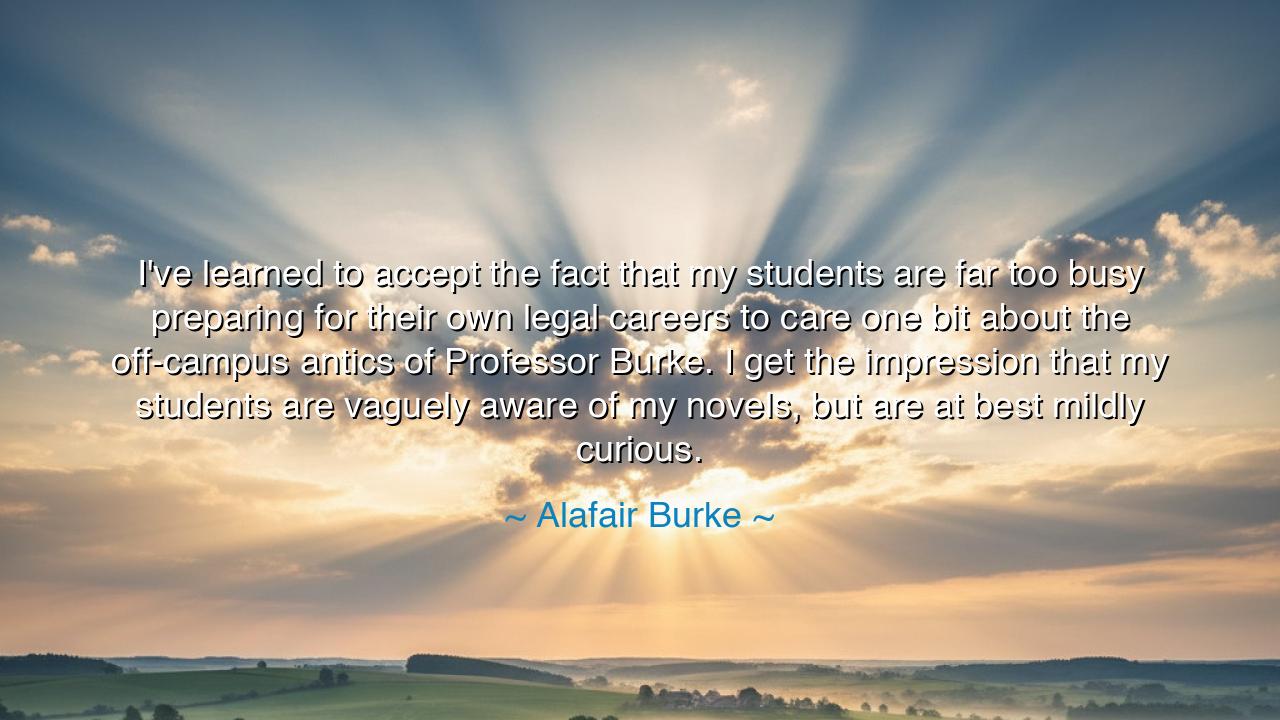
I've learned to accept the fact that my students are far too busy
I've learned to accept the fact that my students are far too busy preparing for their own legal careers to care one bit about the off-campus antics of Professor Burke. I get the impression that my students are vaguely aware of my novels, but are at best mildly curious.






When Alafair Burke said, “I’ve learned to accept the fact that my students are far too busy preparing for their own legal careers to care one bit about the off-campus antics of Professor Burke. I get the impression that my students are vaguely aware of my novels, but are at best mildly curious,” she spoke with the humility of a teacher who has come to understand the natural rhythm of human attention. Beneath her gentle humor lies a deep wisdom: that true purpose requires focus, and that those who walk the path of ambition often see only the goal before them. Her words remind us that greatness is not always accompanied by applause, and that the work of a teacher or creator may flourish unseen, yet still shape countless lives.
Burke, herself both a law professor and a novelist, lives between two worlds — the rigid order of law and the imaginative expanse of storytelling. In her reflection, she accepts that her students, consumed by the pursuit of legal careers, have little interest in the artistic life she leads beyond the classroom. Yet, there is no bitterness in her tone. There is serenity — the calm recognition that every generation must first be absorbed in its own becoming. Her students’ mild curiosity is not neglect, but a sign of the consuming fire of youth striving to carve its place in the world. She honors that fire, even as it burns too brightly to notice her quiet duality.
This acceptance carries an ancient echo, the same humility found in the sages who taught without seeking disciples, who gave knowledge without demanding recognition. The philosopher Confucius once said, “The seeds of virtue may be sown, yet the harvest belongs to the time to come.” In the same spirit, Burke’s words remind us that the impact of a teacher cannot be measured by the students’ immediate attention, but by the unseen roots that knowledge sends into the soil of their future lives. What matters is not admiration, but transmission.
History offers many such examples. Think of Socrates, who never wrote a book and who taught in the open air, while his pupils — Plato among them — sometimes doubted, questioned, even mocked. Yet from those dialogues grew entire civilizations of thought. So too, Alafair Burke teaches without needing to be adored. Her students may not read her novels, but in their diligence and their discipline, they live out the very lessons she embodies: that commitment to craft is its own form of reverence, and that the greatest teachers often plant seeds they will never see bloom.
Burke’s reflection also reveals a quiet truth about the human condition: that recognition is fleeting, but purpose endures. In a world hungry for validation, she shows the grace of one who has found peace in her own identity. The acceptance she speaks of is not resignation, but liberation — the freedom to create and to teach for the sake of creation and teaching themselves. When we cease to demand that others notice our light, it shines all the brighter, because it burns for truth, not attention.
This quote, though modest on its surface, also holds a mirror to modern life. We live in an age where many chase fame rather than mastery, applause rather than understanding. But Burke’s words remind us that true excellence often works in silence. Her students’ indifference is not a wound to her pride, but a lesson in detachment — the ancient art of doing without needing to be seen. It is the wisdom of the craftsman, the scholar, the monk, and the artist who labors not for glory, but for the perfection of the work itself.
So let this be the lesson for those who listen: do not measure your worth by the curiosity of others. Whether you are a teacher, an artist, or a dreamer, your task is to give, to create, to build — even if the world looks away. Your influence, like the roots of a great tree, may lie hidden beneath the surface, unseen yet essential. As Alafair Burke teaches us through her quiet humor and dignity, one’s value does not depend on being admired, but on being true — to one’s calling, one’s work, and one’s self. For in the end, it is not the noise of the crowd that endures, but the echo of integrity that whispers across time.






AAdministratorAdministrator
Welcome, honored guests. Please leave a comment, we will respond soon